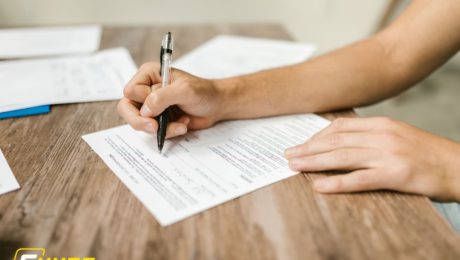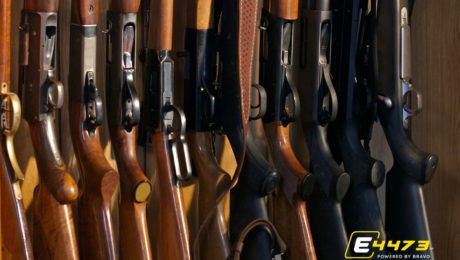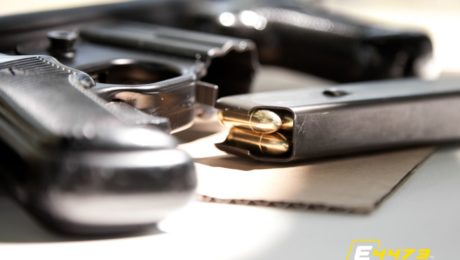While you won’t find the ATF Form 4473 pre-filled online for security reasons, the process of acquiring a firearm still benefits from some advanced preparation. This is especially true for Federal Firearms Licensees (FFLs) who need to ensure a smooth and compliant transaction. So, let’s address a common question: does the Form 4473 have to be filled out in person? In-Person Completion is Mandatory The ATF Form 4473, also known as the Firearms Transaction Record, must be filled out in person by the prospective buyer at the FFL’s location. This is a federal regulation to ensure the identity and eligibility of the firearm purchaser. The Buyer Takes Responsibility The primary responsibility for completing the ATF Form 4473 falls on the buyer. They will answer all the questions about their identity, residency, and eligibility to own a firearm. This includes details like: Full name Date of birth Address history Social Security number (optional) Information about restraining orders or felony convictions (which would disqualify them from purchase) FFL Provides Support While the buyer has the leading role, FFLs play a vital role in facilitating the completion of the ATF Form 4473. Here’s how you can assist your customers: Provide the Form: Keep a readily available stock of ATF Form 4473s (the latest revision) for customers. You can order them for free from the ATF Distribution Center. Offer Guidance: Be prepared to answer questions about the form and clarify any sections that might be confusing for the buyer. Verify Information: You, the FFL, are responsible for verifying the information provided by the buyer. This includes: Checking their identification (valid government-issued photo ID) Running a background check through the National Instant Criminal Background System (NICS) Key Points for FFLs to Remember No Pre-Filling: The buyer must personally complete the ATF Form 4473. You cannot pre-fill any sections for them. Accuracy is Key: Ensure all information is entered accurately and legibly. Complete Your Part: As the FFL, you’ll complete specific sections of the form, including your FFL information, the type of firearm being transferred, and the results of the NICS background check. Sign and Maintain Records: Both you and the buyer must sign the form. You’ll then keep the original ATF Form 4473 as part of your permanent records. Additional Considerations for FFLs Multiple Transfers: If there are multiple buyers for a single firearm, each buyer must complete their own separate ATF Form 4473. Private Transfers: The ATF Form 4473 is not required for private firearm transfers between unlicensed individuals. However, it’s crucial to be aware of your state’s laws regarding private firearm transfers, as some states may have additional requirements. Benefits of a Streamlined Process By ensuring a smooth and accurate ATF Form 4473 completion process, you can: Reduce Errors: Clear communication and guidance can minimize mistakes on the form, preventing delays and potential compliance issues. Improve Customer Experience: A streamlined process creates a positive experience for your customers, fostering trust and loyalty. Maintain Compliance: Accurate record-keeping and adherence to ATF regulations are essential for your FFL’s continued operation. While the ATF Form 4473 must be filled out in person, advanced preparation can make the process smoother for both you and your customers. By understanding your role in facilitating its completion, you can ensure a compliant and positive experience for everyone involved. Make this process as smooth as possible for you and your customers with the help of Bravo’s Point of Sale for gun stores.
As a Federal Firearms Licensee (FFL), ensuring efficient and compliant firearm transfers is paramount to your business’s success. Form 4473 plays a central role in this process, but the traditional paper-based approach can be cumbersome and error-prone. This guide introduces E4473.com – a revolutionary solution designed to streamline Form 4473 completion, optimize workflows, and elevate the customer experience within your FFL. The Importance of Form 4473 and its Challenges Every firearm transfer from your establishment necessitates the completion of Form 4473, a federal document mandated by the Bureau of Alcohol, Tobacco, Firearms and Explosives. This form serves a critical role: Background Checks: Initiates mandatory background checks through the National Instant Criminal Background Check System, verifying your customer’s eligibility to own a firearm. Customer Identification: Captures buyer details like name, address, and government-issued ID information, ensuring the firearm reaches the authorized recipient. Firearm Details: Documents the specifics of the firearm being transferred, such as make, model, and serial number, aiding in ATF record-keeping and tracking. Legal Affirmations: Poses a series of questions the buyer must answer truthfully under penalty of law, identifying any disqualifying factors for firearm ownership. While crucial, the traditional paper-based Form 4473 process presents challenges for FFLs: Time-Consuming Completion: Paper forms lead to errors and require manual data entry, extending transaction times and reducing efficiency. Inaccurate Information: Handwritten forms are prone to mistakes, potentially causing delays due to NICS hold-ups or compliance issues. Inefficient Customer Experience: The paper-based process can be confusing and frustrating for customers, impacting satisfaction. Manual Recordkeeping: Maintaining physical copies of Form 4473s is cumbersome and requires dedicated storage space. Introducing E4473.com: The Solution to Your Form 4473 Headaches E4473.com eliminates the hassles associated with traditional Form 4473 and ushers in a new era of streamlined firearm transfers. This innovative platform empowers your FFL business by: Digital Forms & Workflows: E4473.com replaces paper forms with a user-friendly digital platform. Customers can conveniently complete Form 4473 on their smartphones, tablets, or even in-store kiosks provided by your FFL. Automated Error Detection: Built-in logic identifies potential errors in real-time, preventing mistakes that could delay transfers. Seamless NICS Integration: E4473.com integrates seamlessly with the NICS background check system, expediting the process and providing quicker results. Secure Cloud Storage: Say goodbye to overflowing filing cabinets! E4473.com securely stores completed Form 4473s in the cloud for easy access and retrieval for up to 20 years, exceeding ATF requirements [1]. Beyond Efficiency: The E4473.com Advantage for Customer Experience E4473.com goes beyond streamlining internal processes; it also prioritizes a positive customer experience: Faster Transactions: Digital forms and a smooth NICS integration lead to quicker completion times, reducing wait times and increasing customer satisfaction. Improved Accuracy: Automated error detection minimizes mistakes and ensures a smooth buying process for your customers. User-Friendly Interface: E4473.com boasts a user-friendly interface that guides customers effortlessly through Form 4473, even for those unfamiliar with the process. Investing in Efficiency with E4473.com E4473.com is more than software; it’s an investment in a smoother, more efficient future for your FFL business. By streamlining Form 4473 completion, you can: Reduce Costs: Minimize wasted time and resources associated with paper forms and manual data entry. Increase Efficiency: Boost transaction speed and free up staff time for other tasks. Enhance Customer Satisfaction: Provide a faster, more user-friendly buying experience for your customers. Ensure Compliance: Maintain accurate and secure records effortlessly, exceeding ATF requirements. Ready to revolutionize your Form 4473 process and elevate your FFL business? Bravo Point of Sale seamlessly integrates with E4473.com to enhance FFLs’ operational efficiency and compliance. Together, they streamline firearm transactions by automating ATF Form 4473 completion and submission processes, ensuring accuracy and regulatory adherence.
For any firearms dealer, an ATF audit can trigger a wave of anxiety. The prospect of inspectors scrutinizing your records, inventory, and compliance procedures can be daunting. However, with the right tools and preparation, you can navigate ATF audits with confidence and minimize disruption to your business. This article dives deep into the importance of using software specifically designed to streamline ATF compliance for gun stores, Federal Firearms License (FFL) holders, and gun shops. We’ll explore the challenges of manual recordkeeping, the benefits of automation, and introduce you to Bravo Store Systems – a software solution that empowers you to conquer ATF audits with ease. The Perils of Paper Trails: Why Manual Systems Slow You Down Traditionally, FFLs and gun stores have relied on paper-based systems for recordkeeping. While this approach might seem manageable at first, it quickly becomes cumbersome as your business grows. Here’s how manual systems hinder your ability to prepare for and excel during ATF audits: Time-Consuming Data Entry: Manually entering gun sales information and inventory details is a tedious and error-prone process. This not only eats into your valuable time but also increases the risk of mistakes that could raise red flags during an audit. Data Inaccessibility: Locating specific records amidst a mountain of paperwork can be a nightmare. Auditors expect instant access to information, and delays in retrieving data can cast a negative light on your compliance practices. Inconsistent Recordkeeping: Maintaining consistent formatting and organization across paper records can be challenging. Inconsistencies can make it difficult for both you and auditors to track information and identify trends. Limited Reporting Capabilities: Extracting meaningful insights from handwritten logs is a near-impossible task. Without clear, concise reports, you’ll struggle to identify areas for improvement and optimize your compliance procedures. Embrace Automation: How Software Simplifies ATF Compliance Investing in software specifically designed for FFLs can revolutionize your approach to ATF compliance. Here’s how these tools empower you to streamline recordkeeping and conquer those audits: Effortless Data Entry: Software automates much of the data entry process, saving you countless hours and minimizing the risk of errors. Simply scan barcodes, enter digital signatures, and let the software handle the rest. Instantaneous Access: With a few clicks, you can access any transaction record, inventory item, or compliance document. This ensures that auditors can swiftly review the information they need. Standardized Recordkeeping: Software enforces consistent formatting and data entry practices across your records. This provides a clear and organized view of your operations for both internal review and external audits. Powerful Reporting and Analytics: Generate comprehensive reports that detail sales trends, inventory status, and compliance metrics. Utilize these insights to identify potential risks and proactively address any red flags before ATF arrives. Introducing Bravo Store Systems: Your All-in-One Compliance Solution Bravo Store Systems positions itself as the #1 point-of-sale (POS) software solution specifically designed for specialty retailers like gun stores. Their software goes beyond traditional POS functionality, offering a comprehensive suite of features that streamline ATF compliance: Integrated A&D Book Management: Maintain a digital A&D book with automatic updates for every FFl transaction. This ensures complete and accurate records for easy access during audits. Digital 4473 Management: Process background checks and electronically submit ATF Form 4473 directly through the software. This eliminates paper clutter and ensures timely submissions. Guaranteed Compliance: Bravo’s software incorporates industry best practices and regulatory updates to help you maintain compliance with ATF regulations. Real-Time Inventory Tracking: Track your inventory in real-time, ensuring accurate reporting and preventing discrepancies that could trigger scrutiny during audits. Detailed Reporting: Generate reports that detail gun sales, background checks, and compliance adherence. Utilize this data to identify trends and proactively address potential issues. 100% Uptime: Never worry about system downtime hindering your ability to access records. Bravo works hard to maintain100% uptime, so your data is always readily available. Beyond Software: Additional Tips for a Smooth ATF Audit While Bravo Store Systems provides a robust foundation for conquering ATF audits, here are some additional tips to ensure a smooth inspection: Be Prepared: Understand the ATF audit process and familiarize yourself with the required documentation. Organize your records electronically and maintain a clean, professional workspace. Designate a Point Person: Appoint a knowledgeable staff member to act as a liaison with the auditors. This ensures clear communication and streamlines the inspection process.
As an FFL dealer, navigating the rules and regulations surrounding firearm sales is a critical part of your business operations. One of the most essential components of this process is ensuring that your customers accurately complete the ATF Form 4473. This federal document serves as a background check record and verifies the eligibility of the buyer. Failure to properly fill out this form can lead to legal consequences, making it imperative for both you and your customers to approach it with utmost care and attention to detail. Guiding your customers through the ATF Form 4473 is not only a compliance requirement but also an opportunity to demonstrate your commitment to responsible firearm sales. By taking the time to explain the form and assist your customers in providing accurate information, you can establish trust and credibility while ensuring a smooth and lawful transaction. Here’s a breakdown of the steps involved in filling out Form 4473, which can be shared with your customers: Part 1: Buyer Information (1) Firearm Transaction Record – This section identifies the form as ATF Form 4473. (2) Transaction Number – The dealer assigns a unique number for the transaction. (3) Type of Transfer – Indicate if it’s a new or used firearm. (4) FFL Information – The dealer fills this section with their Federal Firearms License (FFL) details. (5) Transferee (Buyer) Information – Enter your full legal name, address, date of birth, and contact information. (6) Alien Information (if applicable) – Complete this section if you’re not a U.S. citizen or legal resident. Part 2: Questionnaires (10) Are you the actual transferee of the firearm(s) being transferred? – Answer “Yes” if you’re the buyer acquiring the firearm. (11) Are you under indictment for a felony, or have you been convicted of a felony? – Honestly answer “Yes” or “No” based on your background. (12-19) Prohibitions – Answer “Yes” or “No” to questions regarding restraining orders, drug use, dishonorable discharge from the military, and other disqualifying factors. (20) Warning – Read the warning message thoroughly about the penalties for providing false information. Part 3: Additional Information (21) Description of Firearm(s) – The dealer will provide details about the firearm(s) being transferred, including caliber, model, and serial number. (22) Certification of Transferee – You’ll sign and certify that the information provided is true and correct. Part 4: FFL Information This section is reserved for the dealer to complete. They will verify the information you provided, initiate a background check through the National Instant Criminal Background System (NICS), and finalize the transfer process upon approval. Important Reminders Ensure all information is accurate and complete. Don’t leave any blanks; use “N/A” if a section doesn’t apply. Answer all questions truthfully; any false information can lead to serious consequences. Take your time while filling out the form and review it carefully before signing. As an FFL dealer, your role in completing the ATF Form 4473 is crucial. In Part 4, you will verify the information provided by the customer, initiate a background check through the National Instant Criminal Background Check System (NICS), and finalize the transfer process upon approval. Completing the ATF Form 4473 is a vital step in the legal firearm transfer process. By carefully guiding your customers through this process and ensuring accurate information is provided, you not only comply with federal regulations but also contribute to a safer and more transparent firearms industry. This level of diligence and responsibility can help strengthen your reputation as a trustworthy and compliant FFL dealer. It’s worth noting that the requirements and regulations surrounding firearms may vary across different states and jurisdictions. Therefore, it’s always advisable to stay up-to-date with any changes and seek guidance from relevant local authorities to ensure full compliance with all applicable laws and procedures.
The safest way to sell firearms
Schedule your FREE live demo today to see E4473 in action.
![]()





